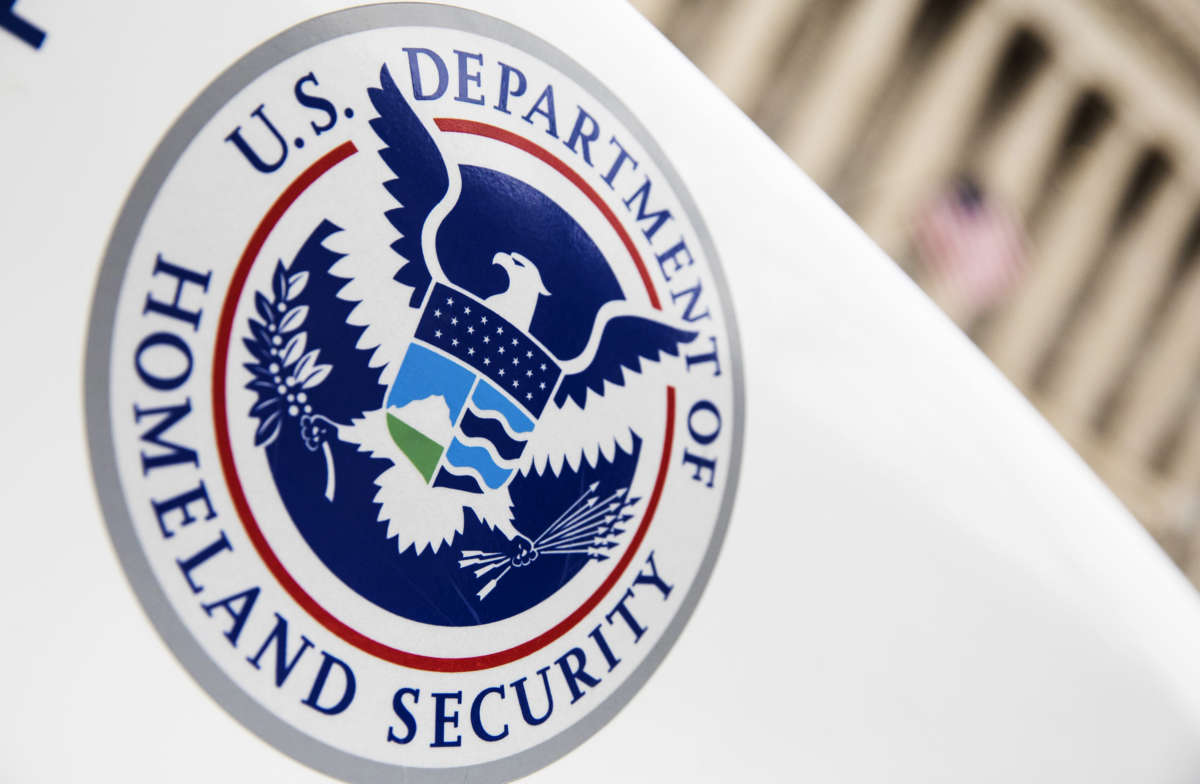Honest, paywall-free news is rare. Please support our boldly independent journalism with a donation of any size.
A new investigation shows that over a third of employees at law enforcement arms of the Department of Homeland Security (DHS) say that they have experienced sexual harassment or sexual misconduct at work — and that officials have been trying to cover it up.
According to documents obtained by the Project on Government Oversight (POGO), 10,410 employees said in an internal survey that they have experienced some form of sexual harassment at work, including hearing or reading inappropriate jokes, promises of rewards for sexual activity, and rape. Roughly 28,000 people participated in the survey, meaning that over a third of respondents, about 36 percent, have experienced sexual harassment at work.
The survey was conducted among employees at Customs and Border Protection (CBP), Immigration and Customs Enforcement (ICE), the Transportation Security Administration (TSA) and the Secret Service. Women make up a small portion of the agencies — at CBP, only 5 percent of the staff are women, according to the draft report.
The survey is part of a report by DHS’s Office of Inspector General that has been in the works for years; a draft of the report was cleared in 2020 but has not been released or finalized. POGO found that advisers close to Inspector General Joseph V. Cuffari have been working to cover up the sexual misconduct portion of the report, deleting parts of the review. Because of these cuts, the report has been held up for over a year.
The fact that officials are attempting to cover up the sexual misconduct rates helps explain why victims are afraid to speak up, the data found. Though at least 10,000 people said that they had experienced sexual harassment between fiscal years 2012 and 2018, only 22 percent of the alleged victims filed a formal report. Among that group, about 41 percent faced retaliation, career-wise.
One of the top reasons victims didn’t report harassment was that they didn’t believe that management would be supportive of employees who reported such behaviors. Other major reasons were that they didn’t believe that the employee who harassed or assaulted them would be investigated, or that they were afraid they would face retaliation for reporting the incident.
Indeed, in many cases, DHS didn’t investigate employees who allegedly harassed or assaulted their coworkers, even when the cases led to settlements in court. One former patrol agent for CBP, Jenn Budd, said that she was raped while in Border Patrol Academy, and told POGO that she faced pressure not to report the assault.
“My experience is not an anomaly,” Budd told POGO. “In general, the agency has an attitude that male agents are to be believed and those who complain about sexual assault or harassment are not.”
“Taken as a whole, detailed evidence in the unfinished sexual misconduct report, as well as cuts from the domestic violence report, create the appearance that the four DHS components — which employ roughly 150,000 federal workers — suffer from a widespread culture of impunity, silencing, and retaliation when dealing with sexual misconduct and domestic violence,” POGO’s Adam Zagorin and Nick Schwellenbach explained.
It’s unclear if DHS Secretary Alejandro Mayorkas is aware of the survey’s findings. A spokesperson for Mayorkas told POGO that he “has made it clear to the DHS workforce that sexual harassment and sexual assault will not be tolerated,” and that the agency is taking steps to combat misconduct through “reforms [to] Department policies and employee trainings.”
Another part of a previous report, of which POGO obtained a draft, found several dozen allegations of DHS law enforcement employees engaging in domestic violence, which were substantiated by investigations. In most of the 35 cases that the Office of Inspector General uncovered, the employee faced no consequences and remained an armed law enforcement officer.
That report was published in November of 2020, but the earlier draft that POGO obtained found that several key portions were removed or altered, including the part of the report that detailed the number of cases.
The title of the report, which originally contained its key finding, was also changed. “DHS Has Not Adequately Addressed Law Enforcement Officer Misconduct Related to Domestic Violence” was changed to “DHS Components Have Not Fully Complied with the Department’s Guidelines for Implementing the Lautenberg Amendment,” a law stipulating that only people convicted of domestic violence can’t carry firearms.
Previous reporting has found that racism and sexism run rampant at DHS agencies. In 2019, an investigative report found a Facebook group where CBP agents made callous jokes and comments about the deaths of asylum seekers and migrants at the border, using slurs and calling them “subhuman.” Agents also posted vulgar memes, including photoshopped images of Rep. Alexandria Ocasio-Cortez (D-New York) engaging in oral sex with a migrant and with then-President Donald Trump.
Although DHS investigated the Facebook group, the agents in the group received little discipline and were allowed to remain in their positions working with asylum seekers.
Press freedom is under attack
As Trump cracks down on political speech, independent media is increasingly necessary.
Truthout produces reporting you won’t see in the mainstream: journalism from the frontlines of global conflict, interviews with grassroots movement leaders, high-quality legal analysis and more.
Our work is possible thanks to reader support. Help Truthout catalyze change and social justice — make a tax-deductible monthly or one-time donation today.
